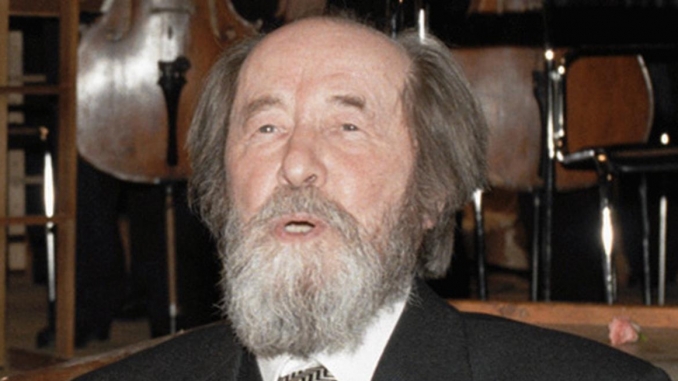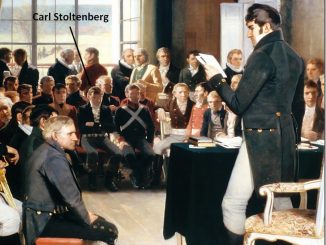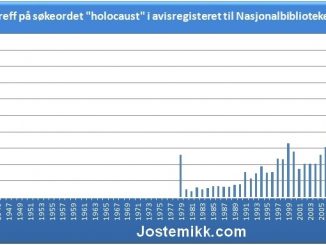
Dette innleggets innhold er i sin helhet sitert fra Aleksandr Solsjenitsyns bok 200 Years Together, og er ment som kunnskapsbringer i forbindelse med den interessante diskusjonen etter Ondskapens arnested – Del I om østjødenes (askenasi-khazarenes) opprinnelse.
Chapter 1: Before the 19th century
From the Beginnings in Khazaria
[G13] In this book the presence of the Jews in Russia prior to 1772 will not be discussed in detail. However, for a few pages we want to remember the older epochs.
One could begin, that the paths of Russians and Jews first crossed in the wars between the Kiev Rus and the Khazars– but that isn’t completely right, since only the upper class of the Khazars were of Hebraic descent, the tribe itself being a branch of the Turks that had accepted the Jewish faith.
If one follows the presentation of J. D. Bruzkus, respected Jewish author of the mid 20th century, a certain part of the Jews from Persia moved across the Derbent Pass to the lower Volga where Atil [west coast of Caspian on Volga delta], the capital city of the Khazarian Khanate rose up starting 724 AD. The tribal princes of the Turkish Khazars, at the time still idol-worshippers, did not want to accept either the Muslim faith – lest they should be subordinated to the caliph of Baghdad – nor to Christianity – lest they come under vassalage to the Byzantine emperor; and so the clan went over to the Jewish faith in 732. But there was also a Jewish colony in the Bosporan Kingdom [on the Taman Peninsula at east end of the Crimea, separating the Black Sea from the Sea of Azov] to which Hadrian had Jewish captives brought in 137, after the victory over Bar-Kokhba. Later a Jewish settlement sustained itself without break under the Goths and Huns in the Crimea; especially Kaffa (Feodosia) remained Jewish. In 933 Prince Igor [912-945, Grand Prince of Kiev, successor of Oleg, regent after death of Riurik founder of the Kiev Kingdom in 862] temporarily possessed Kerch, and his son Sviatoslav [Grand Prince 960-972] [G14] wrested the Don region from the Khazars. The Kiev Rus already ruled the entire Volga region including Atil in 909, and Russian ships appeared at Samander [south of Atil on the west coast of the Caspian]. Descendents of the Khazars were the Kumyks in the Caucasus. In the Crimea, on the other hand, they combined with the Polovtsy [nomadic Turkish branch from central Asia, in the northern Black Sea area and the Caucasus since the 10th century; called Cuman by western historians; see second map, below] to form the Crimean Tatars. (But the Karaim [a jewish sect that does not follow the Talmud] and Jewish residents of the Crimean did not go over to the Muslim Faith.) The Khazars were finally conquered [much later] by Tamerlane [or Timur, the 14th century conqueror].
A few researchers however hypothesize (exact proof is absent) that the Hebrews had wandered to some extent through the south Russian region in west and northwest direction. Thus the Orientalist and Semitist Abraham Harkavy for example writes that the Jewish congregation in the future Russia “emerged from Jews that came from the Black Sea coast and from the Caucasus, where their ancestors had lived since the Assyrian and Babylonian captivity.” J. D. Bruzkus also leans to this perspective. (Another opinion suggests it is the remnant of the Ten Lost Tribes of Israel.) This migration presumably ended after the conquest of Tmutarakans [eastern shore of the Kerch straits, overlooking the eastern end of the Crimean Peninsula; the eastern flank of the old Bosporan Kingdom] (1097) by the Polovtsy. According to Harkavy’s opinion the vernacular of these Jews at least since the ninth century was Slavic, and only in the 17th century, when the Ukrainian Jews fled from the pogroms of Chmelnitzki [Bogdan Chmelnitzki, Ukrainian Cossack, 1593-1657, led the successful Cossack rebellion against Poland with help from the Crimean Tatars], did Yiddish become the language of Jews in Poland.
[G15] In various manners the Jews also came to Kiev and settled there. Already under Igor, the lower part of the city was called “Kosary”; in 933 Igor brought Jews that had been taken captive in Kerch. Then in 965 Jews taken captive in the Crimea were brought there; in 969 Kosaren from Atil and Samander, in 989 from Cherson and in 1017 from Tmutarakan. In Kiev western Jews also emerged.: in connection with the caravan traffic from west to east, and starting at the end of the eleventh century, maybe on account of the persecution in Europe during the first Crusade.
Later researchers confirm likewise that in the 11th century, the “Jewish element” in Kiev is to be derived from the Khazars. Still earlier, at the turn of the 10th century the presence of a “khazar force and a khazar garrison,” was chronicled in Kiev. And already “in the first half of the 11th century the jewish-khazar element in Kiev played “a significant roll.” In the 9th and 10th century, Kiev was multinational and tolerant.
At the end of the 10th century, in the time when Prince Vladimir [Vladimir I. Svyatoslavich 980-1015, the Saint, Grand Prince of Kiev] was choosing a new faith for the Russians, there were not a few Jews in Kiev, and among them were found educated men that suggested taking on the Jewish faith. The choice fell out otherwise than it had 250 hears earlier in the Khazar Kingdom. Karamsin [1766-1826, Russian historian+ relates it like this: “After he (Vladimir) had listened to the Jews, he asked where their homeland was. ‘In Jerusalem,’ answered the delegates, ‘but God has chased us in his anger and sent us into a foreign land.’ ‘And you, whom God has punished, dare to teach others?’ said Vladimir. ‘We do not want to lose our fatherland like you have.’” After the Christianization of the Rus, according to Bruzkus, a portion of the Khazar Jews in Kiev also went over to Christianity and afterwards in Novgorod perhaps one of them – Luka Zhidyata – was even one of the first bishops and spiritual writers.
Christianity and Judaism being side-by-side in Kiev inevitably led to the learned zealously contrasting them. From that emerged the work significant to Russian literature, “Sermon on Law and Grace” (*by Hilarion, first Russian Metropolitan] middle 11th century), which contributed to the settling of a Christian consciousness for the Russians that lasted for centuries. *G16+ “The polemic here is as fresh and lively as in the letters of the apostles.” In any case, it was the first century of Christianity in Russia. For the Russian neophytes of that time, the Jews were interesting, especially in connection to their religious presentation, and even in Kiev there were opportunities for contact with them. The interest was greater than later in the 18th century, when they again were physically close.
Then, for more than a century, the Jews took part in the expanded commerce of Kiev. “In the new city wall (completed in 1037) there was the Jews’ Gate, which closed in the Jewish quarter.” The Kiev Jews were not subjected to any limitations, and the princes did not handle themselves hostilely, but rather indeed vouchsafed to them protection, especially Sviatopolk Iziaslavich [Prince of Novgorod 1078-1087, Grand Prince of Kiev 1093-1113], since the trade and enterprising spirit of the Jews brought the princes financial advantage.
In 1113, Vladimir (later called “Monomakh”), out of qualms of conscience, even after the death of Sviatopolk, hesitated to ascend the Kiev Throne prior to one of the Svyatoslavich’s, and “exploiting the anarchy, rioters plundered the house of the regimental commander Putiata and all Jews that had stood under the special protection of the greedy Sviatopolk in the capital city. … One reason for the Kiev revolt was apparently the usury of the Jews: probably, exploiting the shortage of money of the time, they enslaved the debtors with exorbitant interest.” (For example there are indications in the “Statute” of Vladimir Monomakh that Kiev money-lenders received interest up to 50% per annum.) Karamsin therein appeals to the Chronicles and an extrapolation by Basil Tatistcheff [1686-1750; student of Peter the Great, first Russian historian]. In Tatistcheff we find moreover: “Afterwards they clubbed down many Jews and plundered their houses, because they had brought about many sicknesses to Christians and commerce with them had brought about great damage. Many of them, who had gathered in their synagogue seeking protection, defended themselves, as well as they could, and redeemed time until Vladimir would arrive.” But when he had come, “the Kievites pleaded with him for retribution toward the *G17+ Jews, because they had taken all the trades from Christians and under Sviatopolk had had much freedom and power…. They had also brought many over to their faith.”
According to M. N. Pokrovski, the Kiev Pogrom of 1113 had social and not national character. (However the leaning of this “class-conscious” historian toward social interpretations is well-known.)
After he ascended to the Kiev throne, Vladimir answered the complainants, “Since many [Jews] everywhere have received access to the various princely courts and have migrated there, it is not appropriate for me, without the advice of the princes, and moreover contrary to right, to permit killing and plundering them. Hence I will without delay call the princes to assemble, to give counsel.” In the Council a law limiting the interest was established, which Vladimir attached to Yaroslav’s “Statute.” Karamsin reports, appealing to Tatistcheff, that Vladimir “banned all Jews” upon the conclusion of the Council, “and from that time forth there were none left in our fatherland.” But at the same time he qualifies: “in the Chronicles in contrast it says that in 1124 the Jews in Kiev died [in a great fire]; consequently, they had not been banned.” (Bruzkus explains, that it “was a whole Quarter in the best part of the city… at the Jew’s Gate next to the Golden Gate.”)
At least one Jew enjoyed the trust of Andrei Bogoliubskii [or Andrey Bogolyubsky] in Vladimir. “Among the confidants of Andrei was a certain Ephraim Moisich, whose patronymic Moisich or Moisievich indicates his jewish derivation,” and who according to the words of the Chronicle was among the instigators of the treason by which Andrei was murdered. However there is also a notation that says that under Andrei Bogoliubskii “many Bulgarians and Jews from the Volga territory came and had themselves baptized” and that after the murder of Andrei his son Georgi fled to a jewish Prince in Dagestan.
In any case the information on the Jews in the time of the Suzdal Rus is scanty, as their numbers were obviously small.
*G18+ The “Jewish Encyclopedia” notes that in the Russian heroic songs (Bylinen) the “Jewish Czar” – e.g. the warrior Shidowin in the old Bylina about Ilya and Dobrin’a – is “a favorite general moniker for an enemy of the Christian faith.” At the same time it could also be a trace of memories of the struggle against the Khazars. Here, the religious basis of this hostility and exclusion is made clear. On this basis, the Jews were not permitted to settle in the Muscovy Rus.
The invasion of the Tatars portended the end of the lively commerce of the Kiev Rus, and many Jews apparently went to Poland. (Also the jewish colonization into Volhynia and Galicia continued, where they had scarcely suffered from the Tatar invasion.) The Encyclopedia explains: “During the invasion of the Tatars (1239) which destroyed Kiev, the Jews also suffered, but in the second half of the 13th century they were invited by the Grand Princes to resettle in Kiev, which found itself under the domination of the Tatars. On account of the special rights, which were also granted the Jews in other possessions of the Tatars, envy was stirred up in the town residents against the Kiev Jews.” Similar happened not only in Kiev, but also in the cities of North Russia, which “under the Tatar rule, were accessible for many [Moslem? see note 1] merchants from Khoresm or Khiva, who were long since experienced in trade and the tricks of profit-seeking. These people bought from the Tatars the principality’s right to levy Tribute, they demanded excessive interest from poor people and, in case of their failure to pay, declared the debtors to be their slaves, and took away their freedom. The residents of Vladimir, Suzdal, and Rostov finally lost their patience and rose up together at the pealing of the Bells against these usurers; a few were killed and the rest chased off.” A punitive expedition of the Khan against the mutineers was threatened, which however was hindered via the mediation of Alexander Nevsky. “In the documents of the 15th century, Kievite [G19] jewish tax-leasers are mentioned, who possessed a significant fortune.”




«One could begin, that the paths of Russians and Jews first crossed in the wars between the Kiev Rus and the Khazars– but that isn’t completely right, since only the upper class of the Khazars were of Hebraic descent, the tribe itself being a branch of the Turks that had accepted the Jewish faith.»
Det er vel derfor den zionistiske pressen og forslagsvirksomheten hindrer trykking og spredning av denne boken? For hvis bare overklassen var av hebraisk avstamning, som jeg egentlig betviler, men det er ikke så viktig, så er ikke resten av folket det, og da er de ikke jøder av blod, som khazarene hevder. Og ashkenaziene, som stammer fra Ashkenaz, var av Jaffets slekt (se 1. Mosebok 10:1-3), ikke Sem , som er stamfar til hebreerne (som nedstammer fra Eber), som israelittene nedstammer fra.
Men man må ikke være av Judahs (sønn av Jakob/Israel) blod for å kalle seg jøde, man kan også konvertere, men det betyr å følge Det Gamle Testamentet. Dette gjør ikke khazarene, da de følger Talmud, det er udiskutabelt. Om Talmud, se denne timelange filmen: https://youtu.be/IJxdIXgMGAI (The Other Israel).
Jo egentlig. Man må være av rette blod. Å være jøde har ingen ting med religion å gjøre, det dreier seg om rase. Heri ligger det et paradoks med hele konvterteringsspørsmålet den gang med khazarene. En kan jo spekulere, og en av mulighetene er at de jødiske lederne var få, og ikke hadde et folk å kontrollere/styre, og at de derfor så det tvingende nødvendig å se gjennom fingrene med rase-lovene. En annen mulighet er at det hele var en oppfinnelse, og at «jødene» ble oppfunnet den gangen. Det romerske (bysantiske) riket fant opp kristendommen i samme periode. Det er to ting jeg anbefaler alle interesserte å studere, og det er den babylonske opprinnelsen til flere såkalte religioner, og det egyptiske grunnlaget for de «israelske» historier. Akenathen bør studeres ekstra nøye, men det er ikke så enkelt, for få om noen er så til de grader bevisst forsøkt slettet fra historien. Det er det en grunn til.
Takk, den hade jeg ikke lest mer en korte sitat fra før!